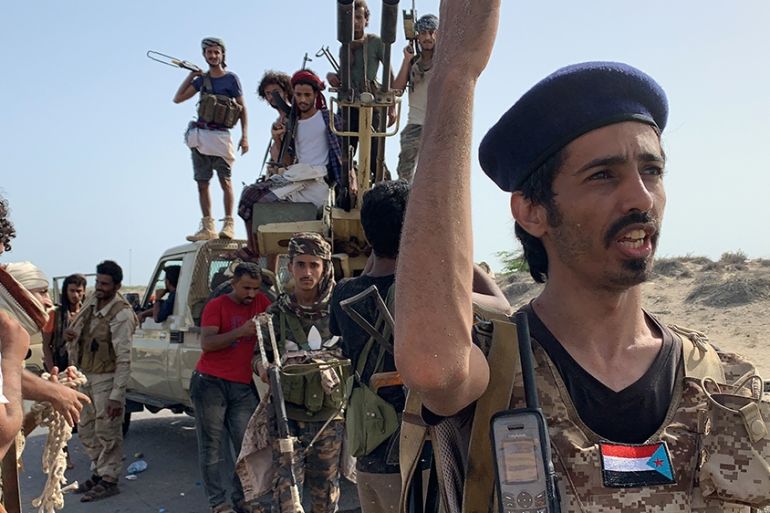Yemen separatists abandon self-rule but peace deal doubts remain
Southern separatists rescind declaration of self-rule, pledge to implement power-sharing deal with Hadi’s government.

Yemen’s southern separatists have pledged to abandon their aspirations for self-rule and implement a Saudi-brokered power-sharing agreement with the government of President Abd-Rabbu Mansour Hadi.
The Southern Transitional Council’s (STC) announcement on Wednesday marked a big step towards closing a major front in Yemen’s chaotic war, and came hours after Saudi Arabia presented a plan to “accelerate” the stalled peace deal’s implementation.
Signed in the Saudi capital, Riyadh, in November last year, the agreement set the stage for the end of a long-running rivalry between the Saudi-supported Hadi government and the UAE-backed southern separatists. Both sides are supposed allies in the Saudi-led military coalition’s war against Yemen’s Houthi rebels, who control the country’s capital, Sanaa.
The Riyadh agreement stipulated the formation of a new unity government within 30 days and the appointment of a new governor and security director for Aden, an STC stronghold and the interim seat of Hadi’s government.
It also specified, among others, the centralisation of all armed groups under government control.
But the deal was never implemented and in April, the separatists declared self-rule and seized control of Aden, a move that ignited fierce fighting across southern Yemen and the Socotra archipelago.
|
|
The standoff between Saudi Arabia and the UAE’s respective allies in Yemen has threatened to shatter the coalition and complicated broader peace efforts to end the five-year conflict, which has killed tens of thousands of people and created the world’s worst humanitarian disaster.
“We have achieved our goals,” Nizar Haitham, STC spokesman, said in a Twitter post on Wednesday.
“The Southern Transitional Council announces the abandonment of the declaration of self-administration in order to allow the Arab alliance to implement the Riyadh agreement,” he said.
The move followed intervention from Saudi Arabia and the United Arab Emirates, noted Haitham, who went on to affirm “the continuing and deepening” of the STC’s “strategic partnership with the Arab coalition”
Saudi proposal
Earlier on Wednesday, the Saudi plan had laid out commitments that have been obstacles for months, such as the formation of a government composed of 24 ministers with equal representation for northerners and southerners, including the separatists.
It also asked for the withdrawal of rival forces from Aden and the flashpoint southern province of Abyan, and gave Yemen’s current prime minister, Maeen Abdulmalik Saeed, the mandate to form a government over the next month.
Shortly after the STC’s pledge to rescind self-rule, Yemen’s state-run SABA news agency named the newly appointed security director and governor of Aden – Ahmed al-Amlas.
Rajih Badi, a spokesman for Hadi’s government, welcomed the Saudi initiative and expressed hope that the separatists would make good on their promise to implement the agreement “out of necessary and urgent national interest”.
Khalid bin Salman, Saudi Arabia’s vice minister of defence, said Crown Prince Mohammed bin Salman’s “efforts have succeeded” to implement the Riyadh deal “and achieve lasting peace, security, and prosperity for Yemen”.
The rapprochement comes as Saudi Arabia and the UAE have sought to inch away from their war with the Houthi rebels, which has pushed millions to the brink of famine and settled into a bloody stalemate.
|
|
Saudi Arabia announced a unilateral ceasefire earlier this year, which swiftly collapsed. Last summer, the UAE announced it was ending its role in the conflict, although it continues to wield influence through its proxies, such as the separatist group.
Mahjoob Zweiri, director of the Gulf Studies Center in Doha, Qatar, said Wednesday’s developments indicate that “all parties are tired and exhausted by this conflict”.
He cast doubts, however, on the Riyadh agreement’s implementation.
“Riyadh and Abu Dhabi do not agree 100 percent on how things should be moved,” he told Al Jazeera. [And] it’s not only those two countries that can decide the situation in Yemen. They also need the international community on board, including the United Nations, Iran. But none of these players have confidence in [Saudi and the UAE].”
He added: “There is no long-term vision. There are different parties with different agendas and no agreement on where things should go.”
Human Rights Watch in November also criticised the Riyadh agreement, saying it failed to address serious human rights violations, including the arbitrary detention and forcible disappearance of dozens of people.
Bleak warning
Wednesday’s developments come as Yemen’s devastated health sector grapples with a major coronavirus outbreak and the country faces a drastic shortfall of humanitarian aid that has forced 75 percent of UN programmes to end or reduce operations.
On Tuesday, UN special envoy to Yemen Martin Griffiths painted a bleak picture of the situation in Yemen to the Security Council.
UN-mediated peace negotiations between the rebels and government have failed to produce an agreement, he said.
Houthi forces were pushing fiercely into the oil-rich province of Marib “with profound humanitarian and economic consequences”, Griffiths said, while missile attacks across the northwest have resulted in civilian deaths, many of whom were children.
Yemen’s economy is collapsing, he continued, food prices are surging, and to make matters worse, an abandoned oil tanker moored off the coast and loaded with more than 1 million barrels of crude oil is at risk of rupture or exploding.
“I do not wish to sugarcoat things,” Griffiths said, warning that the country could plunge at any moment into “a new phase of prolonged escalation, uncontrolled spread of COVID-19, and economic decline”.